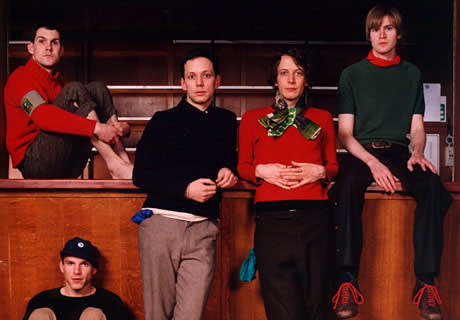Sex, drugs and rock'n'roll are typical vices, but for Brighton, England's British Sea Power, the excess of choice comes from alfresco. "Most things you do are more fun when you do them outdoors," admits the band's singer and guitarist Yan (the band eschews last names).
Known for their intellectually ecological lyrics, as well as planting taxidermic animals and real trees onstage, the band have been tagged as oddball boy scouts. Yet their fascinating courtship with nature has produced Open Season their follow-up to 2003's The Decline of British Sea Power and one of the year's finest epic rock records.
The album's pristine guitars and graceful strings balanced out their debut's bipolar peculiarities. And thanks to Yan and his brother Hamilton's pensive vocals, these self-proclaimed "militant pastoralists" have turned songs about an Arctic ice shelf and finding God in a Wiltshire field into first-rate love songs. "I think people have the tendency to look at nature as either something soft and romantic or as an evil, vengeful woman. For us, it's just about taking the countryside more seriously and appreciating its beauty in a nice way, a less stereotyped way."
Described by the band as "a warm forest and a happy valley," compared to their debut's "coastal, windswept and bleak" feeling, Yan confesses the album's inspiration came with some fresh air. "I'm particularly fond of forests at the moment. Just to get right into the middle of it and sit as long as you can before you get too hungry. Or if you bring some sandwiches, it's even better," he says. "The forest makes you feel quite safe, I think. The coast can be quite bleak. You want somewhere that is safe and protective."
However, as much as the band prosper in their interaction with nature, Yan has learned that taking the forest's contents onstage isn't always the best idea. "There have been dangers. They can turn on you, a tree can. They're dangerous things, really."
Known for their intellectually ecological lyrics, as well as planting taxidermic animals and real trees onstage, the band have been tagged as oddball boy scouts. Yet their fascinating courtship with nature has produced Open Season their follow-up to 2003's The Decline of British Sea Power and one of the year's finest epic rock records.
The album's pristine guitars and graceful strings balanced out their debut's bipolar peculiarities. And thanks to Yan and his brother Hamilton's pensive vocals, these self-proclaimed "militant pastoralists" have turned songs about an Arctic ice shelf and finding God in a Wiltshire field into first-rate love songs. "I think people have the tendency to look at nature as either something soft and romantic or as an evil, vengeful woman. For us, it's just about taking the countryside more seriously and appreciating its beauty in a nice way, a less stereotyped way."
Described by the band as "a warm forest and a happy valley," compared to their debut's "coastal, windswept and bleak" feeling, Yan confesses the album's inspiration came with some fresh air. "I'm particularly fond of forests at the moment. Just to get right into the middle of it and sit as long as you can before you get too hungry. Or if you bring some sandwiches, it's even better," he says. "The forest makes you feel quite safe, I think. The coast can be quite bleak. You want somewhere that is safe and protective."
However, as much as the band prosper in their interaction with nature, Yan has learned that taking the forest's contents onstage isn't always the best idea. "There have been dangers. They can turn on you, a tree can. They're dangerous things, really."
